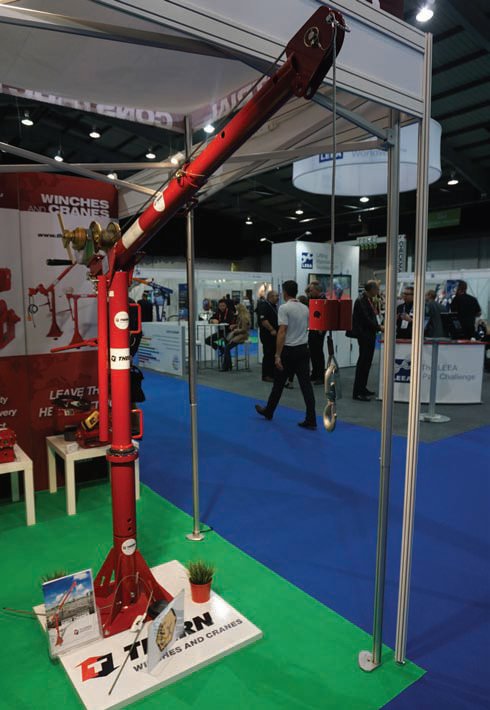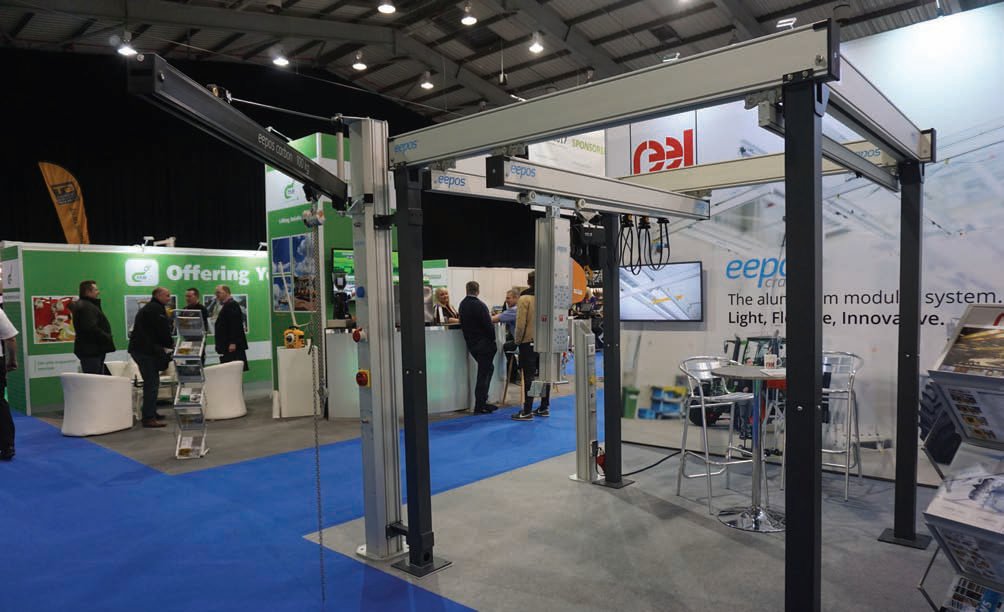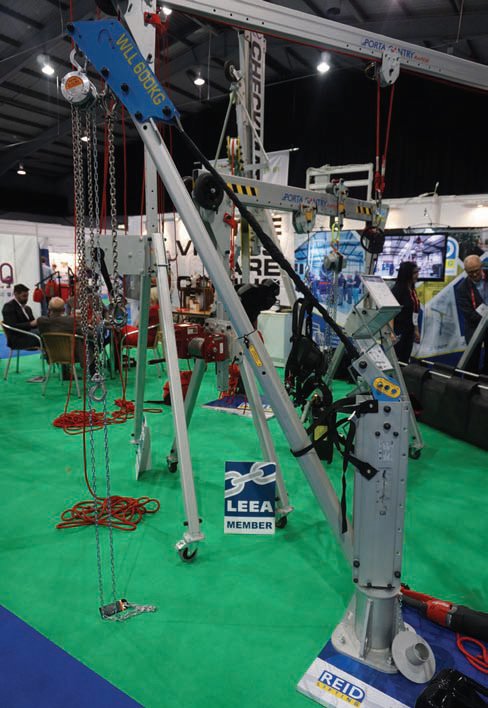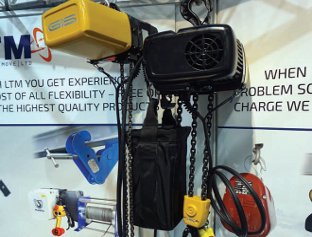Clearer outlook
15 February 2018The exhibitors at UK trade show LiftEx suggested that the UK market is ready to grow, once the uncertainty hanging over it has cleared. Daniel Searle reports.
At the time of writing, the UK construction market has just been rocked by the sudden and dramatic collapse of Carillion, formerly responsible for not just flagship projects such as HS2—the high-speed rail link being built across the centre of England—but a seemingly endless list of infrastructure services too. Supporting the giant were, of course, a large number of smaller, local companies—not just equipment suppliers but sub-contractors as well— all of whom will be hit by Carillion’s collapse to varying degrees.
The short-term and longer-term effects of the collapse remain to be seen, but in late 2017, when I visited the LiftEx exhibition in Telford, the mood amongst exhibitors was one of cautious optimism.
“2017 has been a great year,” said David King, operations director at Lift Turn Move (LTM). “But it’s hard to say why. The majority of our work in 2017 was driven from our UK-based customers, rather than exports derived from the devalued pound.
“Over the last couple of months, people seem to have been holding back, waiting for the green light on investments. But we’ve had lots of proposals and quotations, and lots of enquiries, so we expect 2018 to carry on as 2017 has ended.”
The company has seen some investment come from one of the UK’s most exportable products, the music sector. It supplied electric chain hoists for the worldwide tours of heavyweights Ed Sheeran and Adele, the latter requiring 30 5t-capacity chain hoists that were incorporated into the towers of a circular structure, for the unusual stage set-up.
As the sole UK agent for GIS and Planeta, King highlighted the latest electric winch from GIS, the GP model, with a capacity of 1.25t on two falls. This year the company will introduce higher capacities, with like-for-like models offering 60% capacity increases.
This is facilitated by the use of square chain, which increases the contact between the links, thereby increasing the capacity of the hoists. The weight of the units is also reduced, with the previous 1.6t-capacity model, which weighed 100kg with its chain, now down to 80kg. This is useful for fuel savings, and for manual handling, said King.
Also on show at LTM’s stand was the Planeta drill-powered chain hoist, for applications without power available. Available in 250kg and 500kg models, they reduces strain for the operator compared to manual units, and are currently being launched into the German market.
The key for the UK market is to keep improving the products and service it offers, said Harry Johnson, sales director at Brindley Chains.
“The UK market has generally picked up,” said Johnson, “partly because of the decline of the pound, which has made imports more expensive. But rather than chasing the lowest prices, we need to develop technology and innovation.
“Companies need to be transferrable between services, and offer a good spread of products and maintain best service. Customers are improving standards and safety through investments in products, and suppliers need to meet those needs too.”
One of the company’s latest innovations is its ‘app’, which uses basic information to assist a rigger or salesman in selecting the right chain for each customer and application. “It uses information such as the weight of the lift; whether it’s a 1-, 2-, 3- or 4-leg lift; height restrictions; width; different hooks, and so forth,” said Johnson. “The app then presents four options, with prices, and the user can request a quotation to the nearest distributor. We plan to develop it further to include handbooks, safety and training advice, and more.”
Brindley has been the official UK distributor of Austrian company Pewag since 1984. The company is innovative and technologically advanced, Johnson explained, which also helps Brindley to remain at the cutting edge. Pewag manufactures stainless steel products for the chemical and water sectors, together with specialist products for DNV offshore and the galvanising industry, as well as lifting clamps and magnets. A recentlydeveloped product is the Pro G12, which offers a 50% higher load capacity than Grade 8 chains.
Ben Gates, business development director at Bishop, agreed that the UK market has picked up over the last six months to a year. “It’s been quite a lot busier, but not because of any one factor,” said Gates.
“The market in general has improved. It’s usually quieter in the winter, but that’s not been the case for us this year.”
Bishop is the UK distributor for Illinoisbased Caldwell, which has seen a successful response to its composite lifting equipment, launched around two years ago. “It’s made of fibre-reinforced material and is one-third the weight of steel,” explained Dan Mongan, new products engineer at Caldwell. “It’s non-conductive, which makes it particularly suitable for the utilities industry—we’ve recently had an order of 50 beams to that sector. The products are also non-corrosive, which makes them suitable for the offshore sector. We stock them off-the-shelf, available in capacities from 1/4t to 3t.” In the UK market, the demand for the composite beams will be driven by end users, said Gates: “Once operators use the product and see the benefits for themselves, demand will increase. There are a number of advantages, incuding making manual handling easier and safer, fuel savings, and increasing the duty cycle of equipment.”
Caldwell is also in the process of launching an app to assist operators and distributors in identifying the best equipment for a specific application.
Called Smart Spec, the app helps to choose and configure lifting kit—before the selected beam is automatically engineered and supplied to the customer. The company also manufactures Renfroe lifting clamps. By entering data into Smart Spec such as the lifting turn and plate thickness, the app can inform the user which clamps to use. OIL BE BACK
At Dutch company Thern, a manufacturer of portable davit cranes, sales manager Udo van der Veen attended SPE Offshore Europe in the autumn of 2017 and, returning to the UK for LiftEx, said that the UK oil and gas sector was picking up.
“The show in Aberdeen was good,” said van der Veen. “General industry in the UK seems to be staying at the same level, but the oil and gas market is picking up.”
The company works with several UK distributors, and also supplies other sectors, said van der Veen—particularly the waste water sector, and also the marine and construction industries.
Recently launched is a new davit crane, which offers an increased capacity compared to the previous model—up to 350kg from 225kg. It also has more functionality, said van der Veen, including a wider boom angle. Modulift recently began working with Aberdeen-based distributor First Integrated Solutions who now hold stock of Modular Spreader Beams up to 70t, enquiries are “through the roof”, said managing director Sarah Spivey.
Recently launched by Modulift is the MOD CLS adjustable lifting/spreader beam. “It’s been popular to the point that the company sold out of units during LiftEx,” said Spivey. The key advantage is that the adjustable beam utilises a clamp system which enables the position of the clamps to be easily adjusted, converting between a lifting beam or a spreader beam—and because one system is suitable for a range of lifts, the beams are sold off the shelf with immediate shipping. The MOD CLS is suitable for lifts up to 8t and spans up to 6m. Due to demand Modulift are currently working on developing the system to enable lifting capacities up to 20t. David Ayling, managing director at Straightpoint, also believes that 2018 should see a strong rebound for the oil and gas sector in the UK.
“Overall we had a good year in 2017, and met challenging targets, with a good flow of business,” said Ayling. “We’ve been hearing good news from Aberdeen and Houston. We’ve seen a surge in sales of ATEX equipment to Aberdeen, the redundancies and closures in the oil and gas sector have reduced, and there’s big investment due to take place.
“The effects of Brexit have been positive and negative—the lower value of the sterling has helped our export market, but the uncertainty around Brexit, including the currency fluctations, is not helpful for business.”
A couple of weeks before LiftEx, Straightpoint launched a wireless unit for measuring the height of lifts. It’s useful for, Ayling explained, lifts using multiple jacks— the unit can detect if one jack is higher than the others, which could misalign the centre of gravity, affected the lift and potentially causing it to tip.
Also on show at Straightpoint’s stand was the wireless compression load cell, launched two years ago. Used to calculate loads when jacking up heavy lifts such as bridges or transformers, the units can also be used for calculating the centre of gravity of the lift. Straightpoint has units with capacity up to 500t in stock, said Ayling, but the company has built units with capacity up to 1,500t before.
Reid Lifting has also focused on exports, said marketing associate Rebecca Howard.
“Our sales split is currently about 50:50 between the UK and the rest of the world,” said Howard. “The UK market is steady, with modest growth, but we are focusing hard on developing exports by working through shows and distributors. “We raise the brand profile and awareness by exhibiting at large international trade fairs and support our local distributors with training and demonstrations of Reid’s products to key customers.”
Helping further assist the company’s activity in the export market, Reid was recently the only Welsh company to receive a Heathrow World Of Opportunity grant.
The company launched the Porta- Davit Quantum in 2016, a fully-aluminium davit that weighs in at 18.5kg with 600kg lifting capacity. The one-piece, telescopic structure is stiffer and lighter weight, making it easier to install than previous models—it can be fully assembled in seconds, explained Howard—and the product is versatile, offering uses as a fall arrest system for height safety or rope access use, as well as goods applications in a wide range of sectors. Dual rope capability means that the davit can provide a winch and fall arrest on the same unit. There is no welding on the product, which provides a more consistent product quality and eliminates the need for weld inspections.
The company also demonstrated its Porta-Gantry Rapide, its smallest gantry, weighing just 33kg and able to be folded down and transported in a ‘Stow n Go’ carry-case. Different combinations of capacity and size are available for individual applications, added Howard.
NOTES OF CAUTION
The market may be picking up but it is not yet booming, said Denis Lavery, managing director at Atlas Winch & Hoist Services. “The market is currently treading water,” said Lavery. “Margins have been squeezed, the value of the pound is going down, and there’s uncertainty around Brexit. It’s going to take a while to unpick and re-establish the UK market.
“But, business for us [in 2017] has been slightly better than the previous year. However, we do have to offer additional services to secure some deals, and some prices have necessarily been lowered.” Atlas has been working in the construction, renewables and utilities sectors, said Lavery, as well as in the oil and gas sector in Scotland, marine civils, and harbour projects. The company also provided lifting equipment for the barges used on the recent Forth Crossing project in Scotland.
At Reel, business development and project manager Jason Ravden has seen the onshore market remain steady for the last four years, but the offshore market decline.
“The market is self-driven and needs-driven,” said Ravden. “It gets to a point where even if investment is not widespread, equipment needs to be replaced. However, people are more open to upgrading than they were previously. There is less of a short-term outlook, with customers more interesting in new technology rather than just ordering likefor- like replacements.
“There is also increasing focus on loss time for employees. Industries are getting more employee-focused, and health and safety is getting more efficient, to varying degrees in different sectors.”
Reel produces below-the-hook equipment for systems up to 150t capacity, and for automated cranes. The UK branch of Reel is the sole UK distributor of German company Eepos, which manufactures lightweight aluminium monorail systems. Reel UK also distributes Flex radio control systems.
“Eepos is a big door-opener, and with the Flex remotes we can provide a onestop solution,” said Ravden. “We also have lots of partnerships with other suppliers, so we can put our customers in touch with them if they need anything else. “The Eepos systems are lighter than alternatives, so they put less strain on buildings, and provide a more ergonomic and safer action for operators.
“Aluminium systems is the way the industry is moving—for manual cranes, aluminium gives a smoother motion and requires one-third less effort from the operator.



